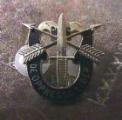Indirect approach could be anything from a development project providing water or electricity, to efforts to train and employ host nation security forces directly against the insurgent elements of their populace.
To me, the latter seems more like a nuanced variation of the direct approach. A nuance that is probably lost on the populaces engaged by such enabled and empowered host nation CT forces.
To me, indirect approaches did not go through the populace to engage the threat, instead they were approaches that recognized that both the government and the threat were competing elements of the same populace, and that the insurgent would not exist if there were no market for what they offered. So, any efforts designed to allow the current regime to preserver without having to listen to and address the concerns of its own populace and thereby reduce that market for illegal change seemed to me to be misguided. Efforts to suppress rather than resolve. Direct or indirect approaches largely being moot.
More important would be to ask:
What is winning? History books tell us winning is when we keep the government we are supporting in power and make the current challenger go away. Countries such as Algeria and the Philippines have become so good at this form of COIN that they have "defeated" insurgencies over and over and over again...
To me, this is not "winning." This is merely suppressing the symptoms of popular discontent long enough to continue to secure ones national interests in some place through the government one is comfortable working with. So long as we are honest with ourselves about that fact, then such approaches may well make sense. But when we delude ourselves that such approaches have the interests of the affected populaces at heart and that they have defeated the conditions of insurgency among those people, rather than simply forcing the people to stand down and defeating some specific insurgent groups, we create dangerous precedent. That precedent is then captured as doctrine and becomes a gift that keeps on giving.
One big problem is that we focus on the direct effects of both our direct and indirect approaches. These direct effects become the basis for our metrics to measure our success. How many wells did one drill; how many villages did one clear; how many HVTs did one capture or kill; etc. Do it, count it, assess it, report it. We believe that the sum of such tactical first order effects must naturally ultimately add up to strategic victory. As the research provided by Mike suggests, there is little evidence of this being true.
If we were assessing a campaign like that waged in WWII such thinking applies. Destroy more capacity than the enemy can produce, capture his territory, etc and ultimately he is defeated. This Clauswitzian logic applies to Clauswitzian conflict.
But it does not apply to the populace-based conflicts we contend with today and that we conflate clumsily under the illogical construct of "Irregular warfare." We lump things by how they manifest rather than by how they form. By their appearance rather than by their nature. We confuse Clauswitzian conflicts that happen to include populace-based organizations with internal populace-based conflicts that Clausewitz simply does not apply to much at all. If the primary conflict is internal to that trinity of People-Government-Army rather than between competing separate systems of that trinity, it is totally different dynamic altogether. It is much more civil emergency than war, regardless of how violent in nature or similar in appearance. One must focus on primary purpose for action of the challenger, and the nature of the relationship between the challenger and the challenged. This provides distinctions that matter. What tactics applied or what ideology ascribed to in of themselves offer little in the way of insight as to what type of conflict this is and how to resolve it.







Bookmarks